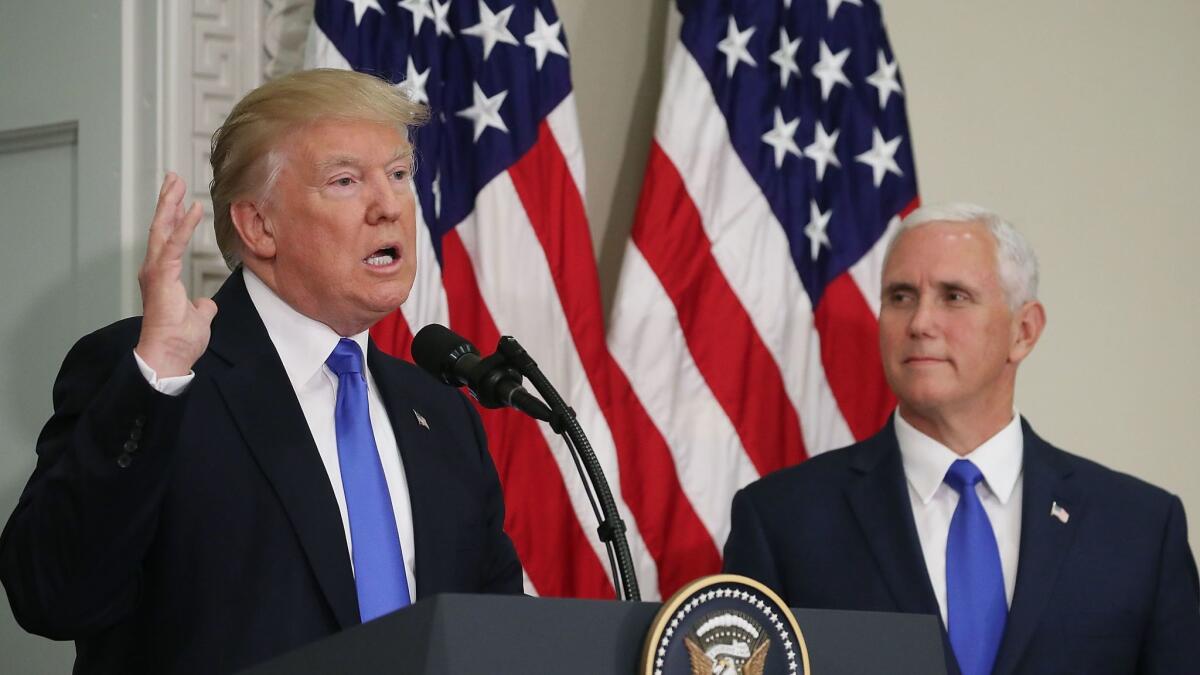Op-Ed: Trump will still yell about voter fraud, but at least his clownish election commission can’t do any lasting damage

- Share via
President Trump’s precipitous decision Wednesday to shutter his “election integrity” commission — buried amid a slew of revelations from Michael Wolff’s new tell-all book about the Trump campaign and presidency — is good news for Americans who care about fair elections in the United States. Though Trump’s tweets Thursday about voter fraud and his announcement that he will shift the commission’s investigation to the Department of Homeland Security means he won’t let go of the issue, the greatest immediate danger to voting rights seems to have passed.
Trump has long made irresponsible and wildly unsubstantiated claims about voter fraud. Before the election, he suggested that there was a great deal of voter impersonation fraud occurring in areas full of poor and minority voters, despite incontrovertible evidence that voter impersonation fraud almost never happens.
After the election, which he lost by more than 3 million in the popular vote against Hillary Clinton, he said that 3 to 5 million illegal (presumably non-citizen) votes were cast. He told ABC interviewer David Muir: “Of those [supposed 3 to 5 million fraudulent] votes cast, none of ’em come to me. None of ’em come to me. They would all be for the other side.”
Just about everyone dismissed Trump’s claims — so far election officials have found about 30 possible cases of noncitizen voting in the 2016 election. The one exception was Kansas Secretary of State Kris Kobach, who told a reporter a few weeks after the 2016 election that Trump “is absolutely correct when he says the number of illegal votes cast exceeds the popular-vote margin between him and Hillary Clinton at this point.”
Trump disbanded the commission because it faced resistance everywhere.
Kobach, one of the country’s leading vote suppressors, has been pushing laws to make it harder to cast a ballot — in the name of preventing phantom fraud. So far he has prosecuted few cases in Kansas, even after being granted unusual prosecutorial powers. He wants people to provide documentary proof of citizenship before voting, a measure that would prevent little fraud but potentially disenfranchise many.
And yet — or should I say “of course”? — Trump put Kobach and Vice President Mike Pence in charge of his “election integrity” group. Past commissions have been bipartisan and stocked with elder statesmen (one notable commission was headed by former President Carter, a Democrat, and former Republican Secretary of State James A. Baker III). This effort was different. It had two Republican heads. It included a rogue’s gallery of the country’s worst vote suppressors, more Republicans than Democrats and few election professionals.
The commission tried to get voting records from election officials across the country and use it to engage in a matching exercise to show the extent to which there was a potential for fraud. Experts worried that the exercise would be unscientific, and my expectation was that the commission would issue a report stating that even if there was no proof of significant fraud, holes in the system made it a serious possibility. The report could have been used as a basis for legislation to make it harder to register and to vote.
Trump disbanded the commission because it faced resistance everywhere. State officials were reluctant to share data with the panel. Democrats did not want to participate in a project aimed at stirring up paranoia. Republican officials saw it as an encroachment on states’ prerogatives to administer elections. Civil rights groups sued over the commission’s shoddy privacy protections and its unwillingness to follow transparency rules. A member of the commission, Maine’s Democratic secretary of state, Matt Dunlap, sued over the commission’s failure to share information with him.
All of these lawsuits prevented the Kobach cabal from operating in private and producing a dishonest report. Rules of transparency and evenhandedness got in the way of chicanery.
After Trump’s announcement, a White House official told CNN that the commission went “off the rails” and Pence distanced himself from it. Kobach tried to put the best face on things Wednesday night, telling Politico: “Anyone on the left needs to realize that by throwing the food in the air, they just lost a seat at the table.” He said he expected Immigration and Customs Enforcement officials in the Department of Homeland Security to take up where the commission left off.
But it is not clear that ICE would be able to accomplish more than this doomed commission. Privacy rules require federal agencies to disclose the use of voter data. If the Homeland Security Department actually does something to please Trump, it will undermine its reputation, and thus its work advising state election officials about how to combat foreign hacking. There will be more lawsuits. Without a commission, there will no longer be a veneer of “bipartisanship,” which could be used to sell new restrictive voting legislation.
Trump will still yell about voter fraud. But the commission was bankrupt before Trump officially yanked its charter, and perhaps with its clownish demise the country can get on to the serious business of improving our election system and protecting it from external hacking and other threats. That remains a desperate need.
Richard L. Hasen, a professor at the UC Irvine School of Law, is the author of the forthcoming book, “The Justice of Contradictions: Antonin Scalia and the Politics of Disruption.”
Follow the Opinion section on Twitter @latimesopinion or Facebook
More to Read
A cure for the common opinion
Get thought-provoking perspectives with our weekly newsletter.
You may occasionally receive promotional content from the Los Angeles Times.









